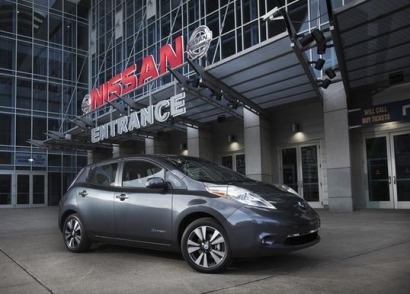
In March the model saw its best sales month ever, and the company reported a 423.5 percent year-over-year sales increase in April.
"From the beginning our goal with LEAF has been to bring affordable, zero-emission transportation to the mass market in a practical, fun-to-drive package," said Erik Gottfried, Nissan director of electric vehicle (EV) marketing and sales strategy.
"With more than 25,000 LEAFs in the U.S. and 62,000 around the world, we're seeing the adoption curve for EVs accelerate, and there is tremendous interest not only on the West Coast but in a number of new strongholds like Atlanta, Raleigh, Denver, Dallas, Chicago, St. Louis and many more," he added.
Nissan LEAF sales have risen steadily since the vehicle's launch and have grown tremendously compared to the previous year with sales jumping several-fold in LEAF's traditionally high-performing markets such as San Francisco—where LEAF was the top-selling vehicle for the Nissan brand in April—Los Angeles, Seattle, Portland and San Diego.
"Pioneering the EV trail with LEAF, we've had the opportunity to evaluate the purchase process of EV buyers. We have maintained an ongoing dialogue with our customers, and through that we've learned just how different the process is for buying a LEAF versus a traditional gas-powered car," said Gottfried. "We've found that customers interested in LEAF come to the showroom exceptionally well educated about the product. Then post-purchase, they stay engaged with us, connect with the LEAF owner community and share their experience broadly, which drives greater interest in LEAF."
"We've also learned how infrastructure plays a role in a consumer's decision to go all-electric," added Brendan Jones, Nissan's director of EV infrastructure strategy and deployment. "We already knew that areas with a higher concentration of EVs would require more charging stations, but trends show that the reverse is also true—a more robust charging infrastructure generates greater interest in EVs and stimulates more EV driving among EV owners."
Nissan said it is continuing to make progress with its commitment to enhance the charging infrastructure in the United States and since announcing plans earlier this year to triple the number of quick chargers from 200 to 600, Nissan and its charging partners already have installed about 50 additional units where interest in LEAF and EVs is highest.
"Nissan is taking a three-prong approach to bolster infrastructure by working with commercial charging partners to bring a variety of charging options to our customers, collaborating with businesses to encourage workplace charging on their campuses and engaging in pilots with our dealers to determine how to optimize the role they can play in EV infrastructure," said Jones. "This enhanced infrastructure—particularly with more businesses offering workplace charging as an employee benefit—builds range confidence and gives EV drivers better end-to-end charging ability, meaning they can leave home fully charged, plug in at work and be charged when they leave."
US pricing for the 2013 LEAF starts at $28,800 and depending on location, some consumers may get the vehicle for as low as $18,800 by qualifying for federal and state tax credits.
For additional information:

